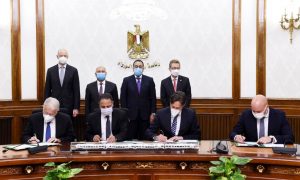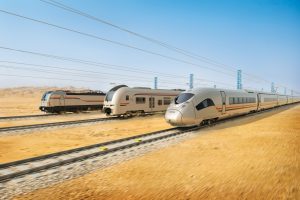 Egypt’s National Authority for Tunnels (NAT) and the consortium of Siemens Mobility, Orascom Construction S.A.E. and The Arab Contractors signed a USD 4.5 billion contract to create a “Suez Canal on tracks”, covering an integrated rail system linking Red and Mediterranean Sea.
Egypt’s National Authority for Tunnels (NAT) and the consortium of Siemens Mobility, Orascom Construction S.A.E. and The Arab Contractors signed a USD 4.5 billion contract to create a “Suez Canal on tracks”, covering an integrated rail system linking Red and Mediterranean Sea.
The Egyptian Prime Minister Mostafa Madbouly and Minister of Transport, Kamel El-Wazir, and the German Ambassador in Egypt, Frank Hartmann, attended the signing ceremony.
The contract is part of a MoU signed in January by the consortium and NAT for the establishment of a 1,000 km rail system of which 460 km will be high-speed rail connection. USD 3 billion is the value of this order.
The contract for the turnkey rail system covers the initial 660 km out of the 1,800 km rail network planned. Additionally, it was agreed to discuss and finalise the agreements on the two other high-speed railway lines including rail infrastructure and trains, and maintenance in the coming months.
Together with partners Orascom Construction S.A.E. and The Arab Contractors, Siemens Mobility will provide its comprehensive turnkey services to design, install, commission, and maintain the systems for 15 years. The total contract value is approximately USD 4.5 billion, of which Siemens Mobility’s share is around USD 3 billion.
 “We are honored and proud to become Egypt’s partner in constructing a state-of-the art rail system that will transform the everyday travel for millions of Egyptian people. Our world class trains will provide an enhanced passenger experience, and combined with our digital leadership in rail infrastructure, we will deliver a safe, reliable and efficient transportation system,” Michael Peter, CEO of Siemens Mobility said at the ceremony.
“We are honored and proud to become Egypt’s partner in constructing a state-of-the art rail system that will transform the everyday travel for millions of Egyptian people. Our world class trains will provide an enhanced passenger experience, and combined with our digital leadership in rail infrastructure, we will deliver a safe, reliable and efficient transportation system,” Michael Peter, CEO of Siemens Mobility said at the ceremony.
For this project, Siemens Mobility will deliver its Velaro high-speed trains, Desiro high-capacity regional train sets, and Vectron freight locomotives.
A safe and reliable signalling system based on the latest computer-based interlocking technology and ETCS Level 2 will be installed, as well as the power supply system that delivers efficient and continuous energy. The German company will also provide and integrate the latest communications, safety and security systems that will create a pleasant passenger experience. The trains as well as all subsystems are based on the most modern and proven products and platforms.
Orascom Construction and Arab Contractors will be responsible for the installation of the tracks, while the customer will build the bridges and facilitate the sub construction.
The Suez Canal on tracks project, comprises a 600 km rail system connecting the port cities of Ain Sokhna on the Red Sea to Marsa Matrouh and Alexandria on the Mediterranean, creating a Suez Canal type of link on the tracks.
The two additional lines will connect the Greater Cairo region from 6th October City along the Nile River with Aswan, and Luxor via Hurghada to Safaga, bringing the total rail network to 1,800 km.
“This high-speed train will strengthen the infrastructure of the areas it passes through and help achieve urban sprawl, in addition to linking the New Administrative Capital and new cities to the railway network for transporting passengers and goods,” the Minister of Transport said.
The consortium will directly create more than 15,000 jobs in Egypt, with an additional 3,800 at Egyptian suppliers and indirectly through the wider Egyptian economy. It is anticipated that many more jobs will be created as soon as the other lines are ready for implementation. “This landmark project will create jobs, boost economic growth, and improve quality of life for millions of people, by creating a more efficient, safe and sustainable transport system. We are committed to providing the most advanced technology and to supporting local skills development” Roland Busch, CEO of Siemens AG said.
The fully electrified system will reduce primary energy usage and overall air pollution by cutting carbon emissions by 70%, in comparison to the current emissions from car and bus transport, increasing the quality of life and protecting the environment for Egyptians.
The connection will transport more than 30 million people per year and save up to 50 percent travel time, which will strongly increase the productivity of workforce. It will link Cairo to the new urban communities being developed.
Share on:



